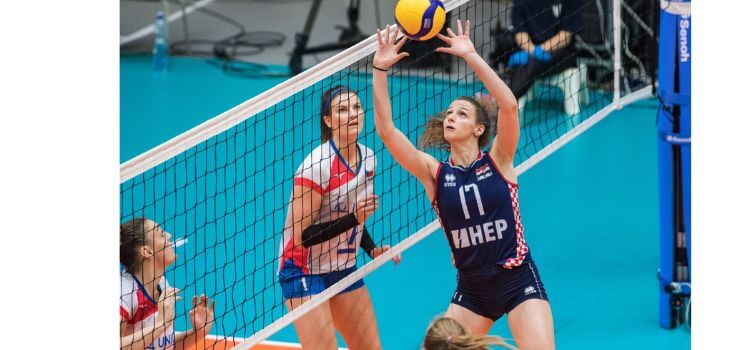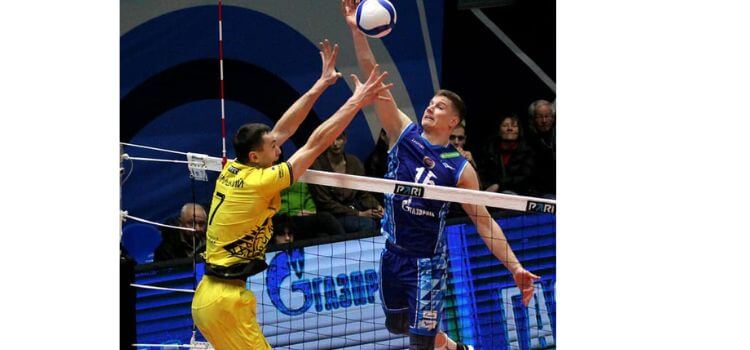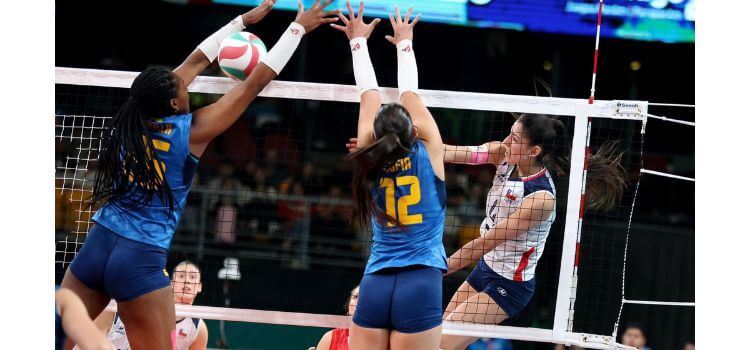As an Amazon Associate, I earn from qualifying purchases
Volleyball is a popular sport that involves two teams of six players each, who try to score points by hitting a ball over a net and making it land on the opponent’s side of the court.
The sport was invented in 1895 by William G. Morgan, a physical education instructor at the YMCA in Massachusetts, USA. He wanted to create a game that was less physically demanding than basketball, but still required skill and teamwork.
Volleyball has since become a global phenomenon, with over 800 million players and fans worldwide. It is played at various levels, from recreational to professional, and has many variations, such as beach volleyball, indoor volleyball, and sitting volleyball.
Personal Connection with Volleyball
I love volleyball because it is a sport that I have been playing since I was a child. I started playing volleyball when I was in elementary school, and I joined the school team when I was in middle school.
I have always enjoyed the thrill of hitting the ball, diving for saves, and celebrating with my teammates. Volleyball has taught me many valuable lessons, such as discipline, perseverance, and sportsmanship.
It has also given me many memorable experiences, such as traveling to different places, meeting new people, and winning tournaments. Volleyball is more than just a sport to me; it is a passion and a way of life.
Why I love volleyball essay for Physical Benefits
Playing volleyball has many physical benefits for the body. Some of them are:
Strengthens muscles:
Volleyball requires the use of various muscle groups, such as the arms, legs, chest, back, and core. By engaging these muscles, volleyball helps to build strength, endurance, and power.
Improves cardiovascular health:
Volleyball involves a lot of movement, such as running, jumping, and changing directions. This increases the heart rate and blood circulation, which improves the cardiovascular system and lowers the risk of heart disease and stroke.
Enhances coordination and agility:
Volleyball requires the players to coordinate their movements with the ball, the net, and their teammates. It also requires them to react quickly and adapt to different situations. This improves the hand-eye coordination, balance, reflexes, and agility of the players.
Mental Benefits of Playing Volleyball
Playing volleyball also has many mental benefits for the mind. Some of them are:
Stress relief:
Volleyball is a fun and enjoyable activity that can help to relieve stress and tension. By focusing on the game, the players can forget about their worries and problems for a while. Volleyball also releases endorphins, which are natural chemicals that make the players feel happy and relaxed.
Boosts mood:
Volleyball can boost the mood and confidence of the players. By achieving goals, overcoming challenges, and winning matches, the players can feel a sense of accomplishment and pride. Volleyball also fosters a positive attitude and outlook, which can help the players cope with difficulties and challenges in life.
Develops teamwork and communication skills that’s Why I love volleyball essay:
Volleyball is a team sport that requires the players to work together and communicate effectively. By cooperating, supporting, and trusting each other, the players can improve their teamwork and communication skills. These skills are essential for success in both personal and professional life.
Social Benefits of Playing Volleyball
Playing volleyball also has many social benefits for the players. Some of them are:
Builds friendships:
Volleyball is a great way to make new friends and strengthen existing ones. By playing together, the players can share their interests, hobbies, and experiences. They can also bond over their common passion for the sport and have fun together.
Fosters a sense of community:
Volleyball is a sport that can bring people together from different backgrounds, cultures, and ages. By playing together, the players can learn from each other, respect each other, and appreciate their diversity. Volleyball also creates a sense of belonging and identity, as the players can feel part of a team and a community.
Provides opportunities for leadership:
Volleyball can provide opportunities for the players to develop their leadership skills. By taking on roles such as captain, coach, or referee, the players can learn how to lead, motivate, and inspire others. They can also learn how to handle responsibility, authority, and pressure.
Emotional Connection to Volleyball
Volleyball is a sport that I have an emotional connection with. It is a source of inspiration, motivation, and joy for me. Whenever I feel sad, bored, or frustrated, I play volleyball to cheer myself up and clear my mind.
Whenever I feel happy, excited, or proud, I play volleyball to celebrate and express myself. Volleyball is also a way for me to connect with my family, friends, and teammates.
We play volleyball together to have fun, support each other, and create memories. Volleyball is a sport that I love with all my heart and soul.
Overcoming Challenges in Volleyball
Volleyball is a sport that also poses many challenges for me. Some of the challenges that I have faced and overcome are:
Injuries:
Volleyball is a physically demanding sport that can cause injuries, such as sprains, strains, bruises, and fractures.
I have suffered from some of these injuries, and they have affected my performance and confidence. However, I have learned to cope with them by following the advice of my doctor, trainer, and coach. I have also learned to prevent them by warming up, stretching, and wearing protective gear.
Competition:
Volleyball is a competitive sport that can be stressful and intimidating. I have faced many opponents who were stronger, faster, and more skilled than me. They have challenged me and pushed me to my limits. However, I have learned to deal with them by staying calm, focused, and confident. I have also learned to respect them and learn from them.
Failure:
Volleyball is a sport that can involve failure, such as losing a match, making a mistake, or missing a shot. I have experienced some of these failures, and they have hurt my feelings and ego.
However, I have learned to accept them by being humble, realistic, and optimistic. I have also learned to improve from them by analyzing, practicing, and trying again.
Strategies for Improving Volleyball Skills
Volleyball is a sport that requires constant improvement and growth. Some of the strategies that I use to improve my volleyball skills are:
Watching and studying:
I watch and study the games and techniques of professional and experienced volleyball players. I observe how they move, hit, serve, block, and defend. I try to emulate their skills and learn from their mistakes.
Practicing and training:
I practice and train regularly and diligently. I work on my fundamentals, such as passing, setting, hitting, and serving. I also work on my advanced skills, such as blocking, digging, and spiking. I also work on my physical fitness, such as strength, speed, and stamina.
Seeking feedback and guidance:
I seek feedback and guidance from my coach, teammates, and mentors. I listen to their advice, suggestions, and criticisms. I ask them questions and seek clarification. I also seek feedback and guidance from myself, by recording, reviewing, and evaluating my performance.
Favorite Volleyball Memories
Volleyball is a sport that has given me many favorite memories. Some of them are:
Winning the national championship:
One of my favorite memories is winning the national championship with my school team. It was a dream come true for us, as we had worked hard and sacrificed a lot for it. We played our best and beat our rivals in a thrilling final. We celebrated our victory with joy and gratitude.
Playing with my idol:
Another favorite memory is playing with my idol, who is a famous volleyball player. I met him at a volleyball camp, where he was a guest coach. He taught me some tips and tricks, and he also played with me in a friendly match. He praised me for my skills and encouraged me to pursue my goals.
Volunteering for a charity:
Another favorite memory is volunteering for a charity that promotes volleyball for underprivileged children. I helped to organize and run a volleyball clinic, where I taught the children the basics of the sport. I also played with them and gave them some gifts. I was touched by their enthusiasm, curiosity, and gratitude.
Impact of Volleyball on Personal Growth

Volleyball is a sport that has had a positive impact on my personal growth. It has helped me to develop and improve various aspects of myself, such as:
Physical:
Volleyball has helped me to improve my physical health and fitness. It has made me stronger, faster, and more flexible. It has also reduced my risk of diseases and improved my immunity.
Mental:
Volleyball has helped me to improve my mental health and well-being. It has made me happier, calmer, and more confident. It has also reduced my stress, anxiety, and depression.
Social:
Volleyball has helped me to improve my social skills and relationships. It has made me more friendly, outgoing, and cooperative. It has also increased my network, support, and influence.
Emotional:
Volleyball has helped me to improve my emotional intelligence and maturity. It has made me more aware, empathetic, and expressive. It has also increased my resilience, optimism, and motivation.
Conclusion: Summarizing the Love for Volleyball
In conclusion, volleyball is a sport that I love for many reasons. It is a sport that connects me with myself, others, and the world.
It is a sport that challenges me, inspires me, and rewards me. It is a sport that benefits me physically, mentally, socially, and emotionally.
It is a sport that has shaped me as a person and has given me many unforgettable memories. Volleyball is not just a sport; it is my passion, my hobby, and my love.
FAQs
Q: What are the rules of volleyball?
A: The basic rules of volleyball are:
The game is played by two teams of six players each on a rectangular court divided by a net.
The objective is to score points by hitting the ball over the net and making it land on the opponent’s side of the court, or by forcing the opponent to make a fault (such as hitting the ball out of bounds or touching the net).
Each team is allowed to touch the ball up to three times before sending it over the net. The same player cannot touch the ball twice in a row.
The ball must be hit with any part of the body above the waist, except for the feet.
The game is played in sets, usually best of three or five. A set is won by the first team to reach 25 points with a two-point advantage. A match is won by the team that wins the majority of the sets.
Q: What are the skills of volleyball?
A: The main skills of volleyball are:
Passing: The skill of receiving the ball from the opponent or the serve and sending it to the setter or the hitter. The most common types of passes are the forearm pass and the overhead pass.
Setting: The skill of setting up the ball for the hitter or the spiker. The most common type of set is the overhead set, where the player uses both hands to lift the ball above the head.
Hitting: The skill of attacking the ball and sending it over the net with force and accuracy. The most common types of hits are the spike, where the player jumps and hits the ball downward, and the tip, where the player gently pushes the ball over the net.
Serving: The skill of starting the rally by hitting the ball over the net from behind the end line. The most common types of serves are the underhand serve, where the player swings the arm below the waist, and the overhand serve, where the player swings the arm above the shoulder.
Blocking: The skill of stopping or slowing down the opponent’s attack by jumping and placing the hands above the net. The most common types of blocks are the single block, where one player blocks the ball, and the double block, where two players block the ball together.
Digging: The skill of saving the ball from hitting the floor or going out of bounds by diving or rolling. The most common type of dig is the forearm dig, where the player uses both arms to deflect the ball upward.
Q: What are the positions of volleyball?
A: The positions of volleyball are:
Setter: The player who sets up the ball for the hitters. The setter usually plays in the right front or the middle front position.
Outside hitter: The player who hits the ball from the left side of the court. The outside hitter usually plays in the left front position.
Opposite hitter: The player who hits the ball from the right side of the court. The opposite hitter usually plays in the right front or the right back position.
Middle blocker: The player who blocks the ball in the middle of the net. The middle blocker usually plays in the middle front or the middle back position.
Libero: The player who specializes in defense and passing. The libero usually plays in the back row and can replace any player except the setter.









